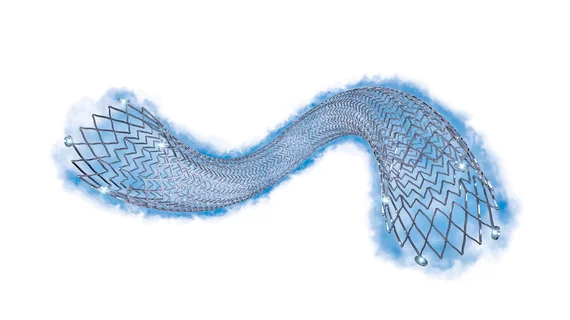Eluvia vascular stent approved by FDA following IMPERIAL
The Eluvia drug-eluting vascular stent system has been approved by the FDA, device maker Boston Scientific announced Sept. 24—just two days after results from the IMPERIAL trial were presented at the Transcatheter Cardiovascular Therapeutics (TCT) 2018 meeting.
The device is designed to treat peripheral artery disease (PAD), a condition affecting about 8.5 million people in the U.S., according to FDA statistics. It offers the sustained release of the drug paclitaxel for a year after implantation.
In IMPERIAL, PAD patients treated in their superficial femoral arteries with the Eluvia stent demonstrated 12-month primary patency of 88.5 percent, compared to 79.5 percent in patients treated with Cook Medical’s Zilver PTX drug-eluting vascular stent. The target lesion revascularization rate at one year was also cut in half with the Eluvia stent (4.5 percent) versus the Zilver PTX (9 percent), although the reduction wasn’t statistically significant.
“In the IMPERIAL trial, the Eluvia stent demonstrated landmark vessel patency and freedom from target lesion revascularization rates, preventing more than 95 percent of patients from needing a reintervention after one year,” William Gray, MD, with Lankenau Heart Institute at Main Line Health in Wynnewood, Pennsylvania, and co-principal investigator of the IMPERIAL trial, said in the release.
“The Eluvia stent is a breakthrough therapy that marks a significant step forward in the treatment of peripheral artery disease, and now with its approval and commercial availability, it has the potential to make an immediate impact on the quality and value of care that physicians can provide to their patients.”

